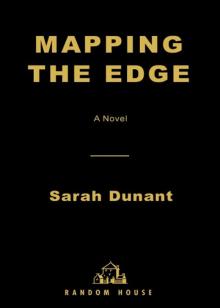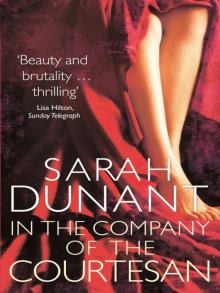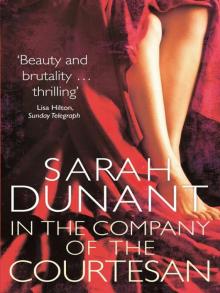- Home
- Sarah Dunant
Birth Marks Page 9
Birth Marks Read online
Page 9
‘Well, of course I’m only a man and lacking in female intuition, but if it were my case I’d assume that referred to Miss Patrick. You add it up over the years and she must have laid out a tidy sum on her little protegée. Not to mention all the emotional investment that couldn’t be paid back.’ Not for the first time I felt more stupid than Frank. ‘So. Do I gather from the silence that you’ve got everything you want?’
‘Just one last thing, Frank. Let’s say they were right. I mean about the man and the money. If it was cash it could still easily have been converted from French francs into English pounds. If my hunch is correct and the reason they couldn’t track her down was because she was in France, is there any way I can check?’
He thought about it. ‘Well, no one stamps your passport any more, but technically anyone staying should be registered as a foreigner. On the other hand it’s not exactly an enforceable law. So, you really think it was a frog, eh? God, no wonder the kid jumped. At least she picked the Thames.’ For some people it goes back as far as Agincourt. For Frank it’s more recent history. Les Misérables. His wife made him take her as a birthday present and then wouldn’t let him fall asleep. ‘Do I gather from this that you won’t be wanting another job next week?’
I didn’t even get the chance to digest the information. Ten minutes later the phone rang again. Her name was Marianne Marshall. She had a dark chocolate voice and a tale about how she had answered the ad and been given an interview in Paris. For a moment I almost got carried away. But nobody gets it handed to them on a plate. She’d been called for an interview, but had been unable to go because she’d got offered another job.
‘To be honest I’d only answered as a bit of a joke. I was sick of being out of work and thought it might be a trip on somebody’s yacht serving martinis for the summer. Of course I didn’t tell them that. I said I was giving up the stage and looking for something more worthwhile. But then this came through, and I must say I wouldn’t normally touch rep, but it was such a wonderful season and they were great parts. Added to which it was Sheffield and there was a possibility of a transfer with the musical. Well, I couldn’t turn it down.’
Marianne Marshall? It certainly hadn’t made a star of her, but she didn’t sound too distraught about it. Her memories of the original interview were similar to the polo pony. A surprising amount of personal stuff, family, health, marital status, that kind of thing. As to the job itself, she knew about as little as everyone else. ‘Of course I asked, and the woman doing the questionnaire said she hadn’t all the details, but that it was some kind of assistant to a wealthy businessman, and I’d know more at the interview.’
‘How did you hear?’
‘I got a call at home one evening.’
‘When was this?’
‘February, the 18th or 19th. I know because I had just done the audition the day before.’
‘Who called, a man or a woman?’
‘Man.’
‘Saying what?’
‘Could I come for an interview three days later. They would pay all my expenses, a car would pick me up at the airport and drive me to the meeting place then take me back. If I had to take a day off work they would reimburse me.’
‘And you told him you couldn’t?’
‘Oh no, at that stage I hadn’t heard from the rep. I said yes. It was all arranged when I got a call from my agent, so I had to ring and cancel.’
‘You don’t happen to remember the name or the number, do you?’ Climb every mountain, leave no stone unturned. I could hear Frank’s voice in the darkness. ‘It’s just like stocktaking, Hannah. The one you miss is the one you’ll need.’
‘Oh, now you’re asking. The name I don’t remember. In fact I’m pretty sure they didn’t give me one. But the number I’ve got written down somewhere.’
‘You have,’ I said casually enough to get an Equity card.
‘Sure, it’ll be in my Filofax from last year. Next to the interview details. If you hold on a moment I’ll get it for you.’
On my pad I doodled around the name Marianne, giving her a cascade of little stars to follow her through life. Then I wrote two names. Jules Belmont and Etienne. I underlined Etienne. She gave me the number for neither. So much for research.
I had a whole story lined up. But I didn’t need to do a thing. The apple fell right on my head.
‘Good afternoon. Belmont Aviation. Daniel Devieux’s office. Can I help you?’
‘Yes, you most certainly can. Do you have Mr Devieux there?’
‘I think he’s in a meeting. Who’s calling?’
I decided to be someone else. Someone more poised and groomed. ‘My name is Fiona Kilmartin, I’m calling from an employment agency in London.’
Did I register a sliver of hesitation? ‘I see. I’m afraid Mr Devieux is a very busy man. Can I ask what it’s about?’
‘No, perhaps instead you might transfer this call to Jules Belmont’s office.’
This time there was a definite blib. ‘I’m afraid Mr Belmont is unwell at present. Er…If you could just give me some idea…’
Brick walls again. Maybe I should try knocking at the door. ‘Very well. I’m looking for some information on a woman I believe he might have employed some time last year. Her name is Carolyn Hamilton.’
‘I see. Well, if you could give me a number, I’ll get him to call you back.’
According to my watch it took her two hours to find the meeting room. In between, Kate rang to find herself talking to the Potential Employment Agency. The phone went again just after five.
‘Yes, I’ve spoken to Mr Devieux. I’m sorry, we can’t help. He says he has checked all the relevant files and has no record of a woman called Carolyn Hamilton.’
But then he wouldn’t, would he? Not if he had anything to hide. The phone hummed disconnection in my ear. I dialled another number. With luck Andy would still be at the office. Even if I was wrong what else did I have to waste my time on?
CHAPTER EIGHT
Every girl should have one. A man who knows his way around the schedules and the price wars. The only trouble is you have to get up at dawn to take advantage of Andy’s cheap flights. And travel to the ends of the earth to catch them. City Airport Docklands, an invention of eighties’ capitalism, the art of PR triumphing over reality. Before the fall (real estate not man) it had all seemed glitteringly possible, a new city rising like a phoenix from its nineteenth-century slums with its own airport carved out of the old Victoria and Albert docks, planes taking off where the Empire had once steamed in. Now, with riverside homes being given away free in cornflake packets and developers turning as liquid as the Thames, the airport was already a commercial bad smell. Her Victorian Majesty would not have been amused. Neither was I. The meter in the cab read thirteen pounds.
On the runway a midget plane with Biggles-type propellers sat waiting, the kind of thing a DC10 might eat for breakfast. Inside was a bit like being in the belly of a bomber. I took comfort from the fact that it was too small to warrant sabotage and served free champagne.
Over Brittany I tried my hand at a little storytelling. Once upon a time there was a young woman called Carolyn Hamilton who met a young/older man and didn’t live happily after. Fill in the gap. Scenario one: the rich French stranger. Tired with London, and therefore tired with life, our heroine answers an ad for a job in France with enough money to mop up her medical and drug debts. She goes to Paris for an interview, doesn’t get the post, but does get herself a man. (Who, how and where to be worked out later.) The power of French kisses brings her back for more, the weakness of French letters keeps her there. She tries, with the father’s money but not necessarily his support, to make a go of it but the French are so cruel to women larger than a size ten that she is forced to return to London, where she goes dancing one night on the embankment, misjudges her new centre of balance and falls in. Crime fiction: the murder of fact in pursuit of fiction? I had another glass of champagne and tried again.
Scenario t
wo: Carolyn goes to Paris for an interview with Belmont Aviation, either the man himself or one of his legates. What he—or the other he—is looking for is a rather special young woman: healthy, attractive, intelligent with a love of life and the urge to earn exceptional money. An office drudge she is obviously not. Clearly what is on offer here is something more ambiguous, more in the realms of Mrs Sanger’s vision: a gorgeous slave to manage his hectic diary, entertain his international clients, maybe even stand in for his wife when she had the occasional headache from shopping too hard. And English? Well, maybe he’s already got a reputation for this kind of thing in France and is having to travel a little further afield for fresh meat. He meets Carolyn, likes what he sees, gets to know her better during a series of interviews and, hey presto, before you know where you are he and she are making more than airplane parts. Since she has nothing to loose she decides to keep the child. In the spirit of paternalistic capitalism he keeps her on the payroll for a while and she spends a long hot summer in a Paris apartment knitting a layette and sending postcards home in the diplomatic bag. Then a month before the baby is due Madames Belmont/Devieux find out about their husbands’ indiscretion, swoop down on Paris like avenging Chabrol wives and chase our rotund heroine home to London where, rather than face the consequences, she decides to end it all in the aforesaid muddy waters. Hmm. I liked that one. It had a certain ring to it. Now I had the story, all I needed was the facts.
Belmont Aviation, I had already learnt from the international operator, was situated in the Zone Industriel at Roissy. As it wasn’t far from the airport I thought of going there first, but since according to the map there didn’t seem to be a lot more in Roissy than the zone, and it was a long time since I had shimmied down the Champs-Elysées, I decided to base myself in Paris anyway. From Charles de Gaulle I took the train into town and walked from Hotel de Ville across to the Left Bank. I had a memory of a spectacular little hotel just over the bridge from Notre-Dame, all wooden beams and Van Gogh chairs, but it had been a while and the streets all looked the same. So did the hotels, small twin beds and plastic fittings. It had happened everywhere else, why should Paris be immune? I ditched romance in favour of utility, booked myself into the one nearest to the Métro, changed into my nifty little checked business suit specially preserved in tissue paper for the occasion, and set off for Roissy.
It was harder than it looked: subway, train and taxi and even then it wasn’t an exciting journey. You’ve seen one industrial zone and you’ve seen them all: flat-packed ghettos cutting into the countryside with their steel-clad factories and brightly coloured warehouses. Belmont Aviation wasn’t hard to find. It was bigger than most, set back from the road in its own little landscaped park. A tribute to post-modernism, the office building looked like a Mies van der Rohe tower that had toppled on to one side: long clean lines of smoky-brown mirrored glass rising out of a cricket-pitch lawn and dinky flowerbeds. Green peace and industry. Even the taxi driver seemed proud of it, eager to tell me how, while other businesses tried to separate the shop floor from the administration (the bigwigs like to work near home), Belmont had always done as his work force. Hence their presence here at Roissy. Outside the front entrance stood a large statue of a man clasping a bolt of lightning, with a young child at his feet, arms outstretched. It looked like a cross between Rodin and Soviet Realism.
In the lobby a security man directed me to the front desk, where I exchanged pleasantries with a well drilled receptionist. I had decided to go first for the boss. That way they could feel good about fobbing me off with one of his senior executives. I had come to see Mr Belmont. She shook her head. Mr Belmont was not available. Still indisposed, I wondered? You could see she found my choice of words strange. Maybe it was common Roissy knowledge that the guy was off having major bypass surgery. Never mind. Mr Devieux would do. She frowned. Did I have an appointment? Well, she really didn’t think…I asked her to try anyway and gave her a card. She looked at it, then back up at me. I translated security and private investigation into French. She nodded and told me to take a seat. You could tell from the way she said it she didn’t think I had much hope.
The first half hour was fun. You can tell a lot about a tycoon from his employees. They were a smart set, the Belmont babies, all shiny shoes and designer suits: the women in particular all seemed to have the same optician, and the same little ski-run noses with glasses perched halfway down. Their heels clicked sexily across the polished floors, neat little steps constricted by fifties’-tight skirts, tapping out the rhythm of successful business. Even their haircuts looked the same, a subtle touch of Louise Brooks held in place with, no doubt, environmentally friendly aerosols.
Then, just when I was beginning to get bored, I got the brush-off. The receptionist was talking into the phone, but looking at me. She put her hand over the mouthpiece. ‘Madame Wolfe?’
I stood up and smoothed my skirt, but the creases had settled for the day. ‘I have Madame Claire, Mr Devieux’s personal assistant on the line for you.’
Madame Claire and I, of course, had already met, although she didn’t know that. She wasn’t much more accommodating second time around. Mr Devieux was not available today. If I wrote a letter stating my business she might be able to help me herself or make an appointment for the future. I explained that I had trouble with the future, since I was only in Paris for three days of it. I also told her that the matter was urgent and confidential, that I was investigating the death of a young British woman, one of Belmont Aviation’s former employees, and that if Mr Devieux would not see me I would be forced to try and arrange an interview through the Roissy police department. There was just a beat of a pause in response to that one. Then she asked for a number where I could be contacted and said she would be in touch. We left it at that. It was not exactly triumph, but I allowed myself to feel a certain glow of success. I walked out into an early Roissy afternoon.
I spent the journey back working. I had left London too early to check the local library’s International Who’s Who, and the only papers on offer on the flight had been English ones in which Belmont Aviation didn’t rate a mention. Typical of the British. European only in name. Now though, as I sat munching my way through the business pages of a clutch of newspapers and magazines from the station tabac, it was a different story. Still no photo of the man himself, but the kind of company reports to bring a warm glow to the shareholders’ hearts. Boosting exports, encouraging home growth, spawning baby companies; if the press was to be believed the Belmont empire was an economic miracle—not so much a person, more a way of business. The man at the top must be just the kind of chap—in Mrs Sanger’s eyes—to need a whole slew of personal assistants. I couldn’t wait to meet him.
It was three o’clock when I reached the hotel. No one had called. I sat and waited, but the plastic fittings didn’t get any better and outside Paris sparkled in an unexpected burst of sunshine. It was time to pour a libation to memory. I spent the latter part of the afternoon riding the escalators up and down Beaubourg counting the wads of chewing gum that the French had stuck into the heating ducts. Then I walked across the river to the Tuileries and watched squirrels steal peanuts from children’s hands. It got colder as dusk came on. I liked it better that way. Paris was different in the winter: there was a kind of cleanness to the city, an unselfconscious quality of life without tourism. When Carolyn Hamilton had arrived here (I should have said ‘if’ she arrived here, but I was fed up with ifs), it would have been May and Paris would have been already dressed to receive visitors, all new green froth and blossoms spreading coquettish memories of light romance and Hollywood. Of course she would have fallen for it, first time away from home and a whole French summer stretching ahead of her.
I walked back along the embankment, where a dozen plant shops spewed out buds and creepers on to the street, while twc blocks down cages of songbirds serenaded rabbits, hamsters and even the occasional ferret. The Left Bank seemed quiet in comparison. At the corner of my street a man
was rolling down shutters on a laboratory shop. The side window was filled with intricate plaster-cast side-sections of the human body: intestines, urinary tracts and oesophaguses, all pink and white and fleshy. And there in the middle sat a cosy round uterus, with a 2001-like foetus curled up on itself protected by layers of tissue and blood. It looked so peaceful in there, waxy and smooth, waiting for B-day. I decided it was more of a sign than any sheep’s entrails.
I got back just before 6.00 p.m. to find a message from Madame Claire taken thirty minutes before. It was more or less the right timing. If the world wagged according to my theories then someone, either her or Devieux himself, would already have been on the phone to Potential to check up on Fiona Kilmartin’s credentials. And if Mrs Sanger had had her wits about her (and she had in the past) then she would already have put two and two together with the loss of her address book and come up with me. So who should turn up next day demanding an interview but the thief herself? Now came the crunch. If they really had nothing to hide, there was no reason not to see me. And if, by chance, there was something nasty in the woodshed, all the more reason to pretend there wasn’t. They obviously saw things my way. When I called back she informed me that Mr Belmont himself would meet me at 8.30 a.m. sharp tomorrow morning in his office. Mr Belmont himself, presumably up, like Lazarus, from his sick bed. I put the phone down and gave just the smallest of whoops of triumph. Nothing so gross as hubris, you understand, just a sense of getting back out what you put in. 8.30 a.m. sharp. That left fourteen hours in which to have fun. I had earned it. My restaurant guide and I went out together. First stop, my local bar for an apéritif.
I think he must have come in about ten minutes later. Certainly he wasn’t there when I arrived—I would have noticed. There had been a time, while I was still living with Joshua but already alone in my head, when I developed quite a thing for strangers. That was the point, of course, their anonymity: the perfect antidote to the slow strangulation of domesticity. Looking back on it now it seems rather cold and calculating, but it wasn’t like that at the time. At the time just the thought of it could light fires in my stomach: mutual sexual appreciation completely unconnected with real life, a much underrated form of romance. Of course I never told him. I mean it was only occasional and he would have had to take it personally when it wasn’t meant so. Later, after we split up, the appeal faded. Or maybe I just got used to the singular comfort of a double bed. Either way it had been quite a while and tonight I wasn’t sleeping at home. Who knows, maybe Carolyn Hamilton had been sitting in a bar when she noticed a good-looking stranger.

 Mapping the Edge
Mapping the Edge The Birth of Venus
The Birth of Venus In the Name of the Family
In the Name of the Family Snowstorms in a Hot Climate
Snowstorms in a Hot Climate In the Company of the Courtesan
In the Company of the Courtesan Birth Marks
Birth Marks Transgressions
Transgressions Under My Skin
Under My Skin Blood & Beauty: A Novel of the Borgias
Blood & Beauty: A Novel of the Borgias Blood & Beauty
Blood & Beauty Sacred Hearts
Sacred Hearts In the Company of the Courtesan: A Novel
In the Company of the Courtesan: A Novel